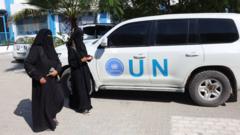In the beleaguered region of Gaza, residents are grappling with an escalating humanitarian disaster, already strained by war and blockades. Recent Israeli legislation seeking to isolate the United Nations Relief and Works Agency for Palestine Refugees in the Near East (UNRWA) has led to widespread concern that critical aid and services are at risk of collapsing entirely. Yasmine el-Ashry, a resident of Khan Younis, expressed the gravity of the situation, stating, "Unrwa means everything to us: it is our life, our food, our drink, and our medical care. When it closes, there will be no flour. If my son gets sick, where will I go?"
Many residents perceive the ban on UNRWA as an additional assault on the Palestinian people. "Banning UNRWA is another war for the Palestinian people," asserted Saeed Awida, a registered refugee, voicing fears that such measures are part of an overarching plan to eradicate Palestinian presence and identity. Despite strong opposition from the international community regarding Israeli policies, the ruling party in Israel has moved forward with legislation to limit collaborations with UNRWA, a decision supported by numerous parliamentarians who claim that the agency has become linked to Hamas, an organization they label a terrorist group.
Opposition figures, such as Sharren Haskel, argue that strong steps must be taken to prevent any potential association with groups they view as harmful to Israeli citizens. Meanwhile, UNRWA asserts its commitment to neutrality in providing essential humanitarian support, emphasizing that if the Israeli legislative plans take effect in three months, their ability to operate could be fundamentally undermined.
Sam Rose, UNRWA’s deputy director for Gaza, has indicated that without coordination with Israeli officials, the agency would struggle to deliver necessary supplies to the population, leaving countless individuals vulnerable and without support. The ramifications of this action transcend immediate aid disruption; they risk dismantling the protected status of schools and clinics where many displaced individuals seek refuge. Reports from Israeli media suggest concerns from both diplomats and security experts regarding the potential fallout of this decision.
Historically, UNRWA was established in 1949, following the first Arab-Israeli War, to assist the burgeoning population of Palestinian refugees, which has now expanded to approximately six million across the region. Accusations against the agency, including the alleged promotion of anti-Israel sentiment, have intensified amid continued conflict, particularly following the Hamas attacks in October last year. As the situation develops, many in Gaza fear a deliberate dismissal of their status as refugees, encapsulated in the words of Mohammed Salman: "I am telling you that the word 'refugee' will disappear. They do not want the word refugee. Israel is looking for this."


















